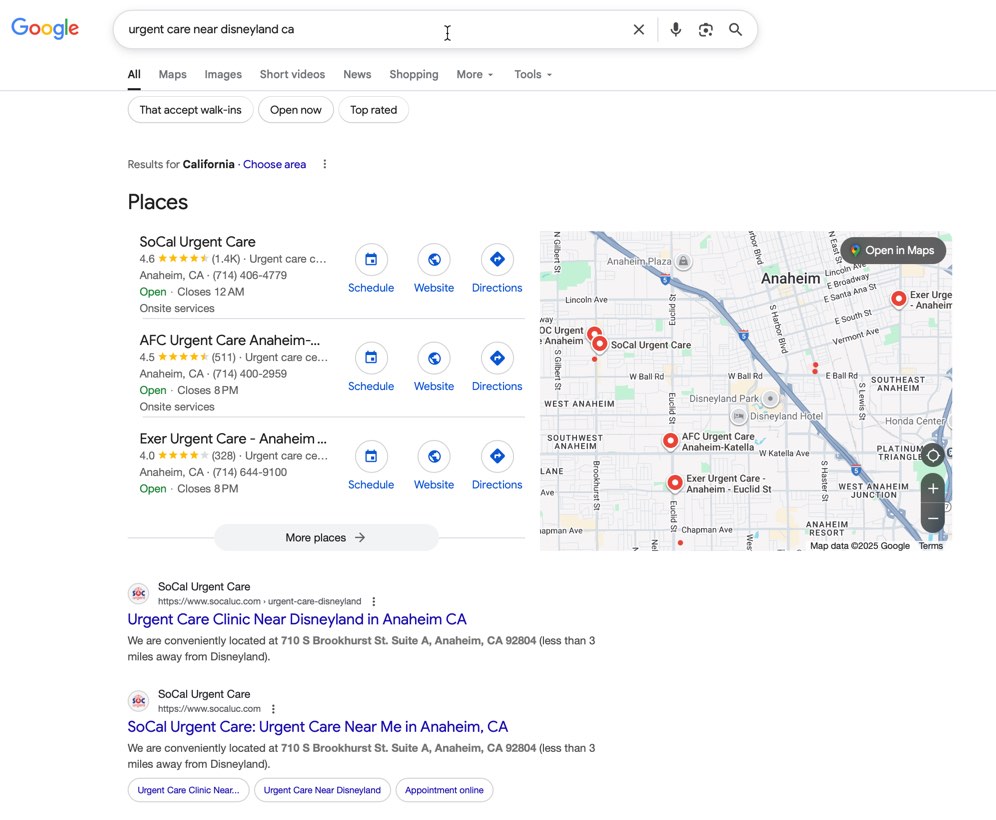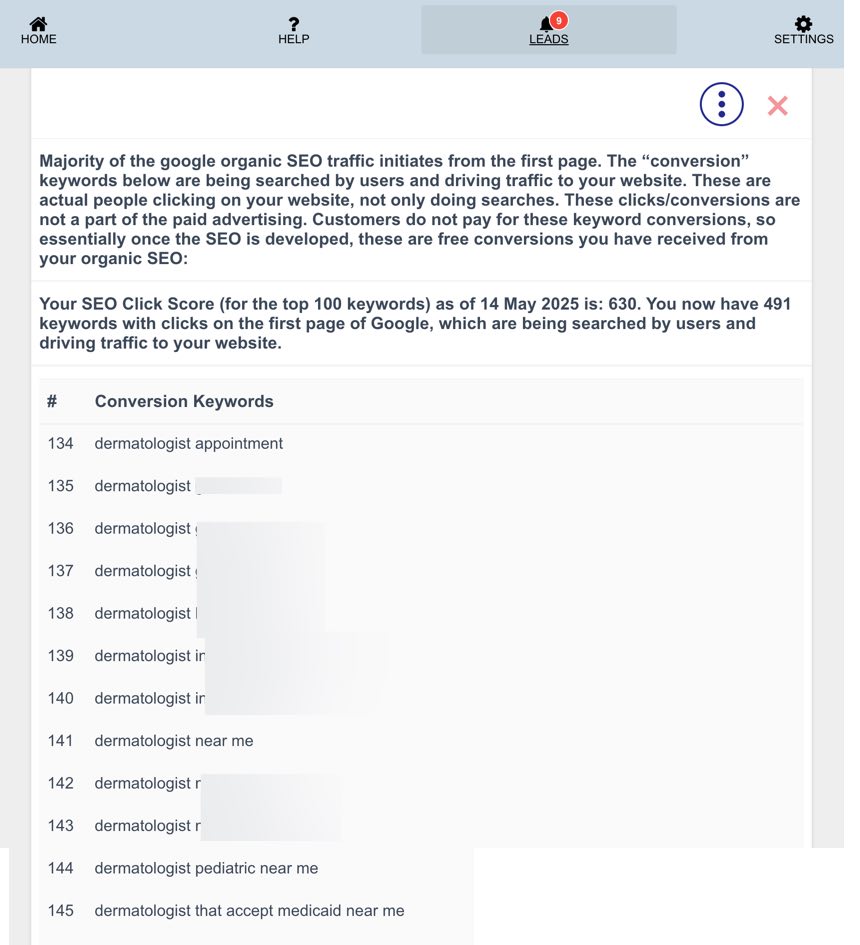Why is SEO for Doctors so difficult?
SEO for doctors is exceptionally difficult. It’s a common frustration for physicians who see marketing agencies produce great results for other industries but struggle with healthcare. SEO for doctors and medical practices is notoriously challenging due to the unique combination of high competition, strict regulations, and patient trust requirements. Unlike typical businesses, healthcare providers face specific obstacles that make ranking on Google particularly difficult.
Why healthcare SEO is so hard? The number one factor is constant SEO content creation based on your healthcare services
In addition to many factors listed below, the most important factor and difficult: Adding helpful, non-plagiarized SEO content. And it should be added or updated every month. Fresh content that is relevant to patient’s search patterns and AI agent’s questions has the most impact on the SEO of your healthcare practice’s website.
1. High Competition in the Healthcare Industry
Medical services are highly competitive, especially in metropolitan areas. For every specialty—dermatology, plastic surgery, dental care, weight loss, or urgent care—there are dozens or even hundreds of providers competing for the same patients.
Example: A dermatologist in Los Angeles not only competes with other dermatologists in the city but also with national chains offering cosmetic treatments. Ranking for keywords like “Botox near me” or “laser hair removal Los Angeles” is extremely competitive, and Google tends to favor websites with strong authority, consistent reviews, and high-quality content.
2. Strict Google Guidelines for Health Content (YMYL)
Healthcare content falls under Google’s “Your Money or Your Life” (YMYL) category. This means Google scrutinizes medical websites more strictly because inaccurate information could directly impact a person’s health. To rank well, doctors’ websites must demonstrate:
- Expertise: Content should be written or reviewed by qualified medical professionals.
- Authority: Credentials and experience must be clearly displayed (board certification, years of practice).
- Trustworthiness: Secure website (HTTPS), clear contact information, patient reviews, and privacy policies.
Example: A website page about migraine treatments must cite authoritative sources, include proper disclaimers, and avoid overpromising outcomes. Google gives higher ranking priority to medically accurate, trustworthy content.
3. Local SEO Challenges
Most doctors serve a specific geographic area, so local SEO is critical. However, local SEO has its own set of challenges:
- Google Business Profile (GBP) optimization: Accurate NAP (Name, Address, Phone), category selection, and reviews are essential.
- Local competition: Even within the same city, multiple doctors target similar services, making it hard to rank in the local map pack.
- Patient review management: Positive patient reviews influence rankings, but acquiring authentic reviews consistently can be challenging.
Example: A dentist in Miami may struggle to appear in the “top 3 local results” for “teeth whitening Miami” if competitors have hundreds of recent, high-quality reviews and strong local links.
4. Content Restrictions and Compliance
Doctors must create informative, medically accurate content without violating HIPAA, medical advertising rules, or making claims about outcomes. This restricts the types of content they can produce, limiting aggressive marketing strategies that work in other industries.
Example: A weight loss clinic can’t promise “Lose 20 pounds in a month” in blog posts or ad copy, which makes keyword targeting and content creation more nuanced than in non-medical industries.
5. Slow Results and Continuous Effort
SEO for doctors is a long-term strategy, unlike PPC ads that provide instant traffic. It can take months to rank for competitive keywords, and results fluctuate due to algorithm updates, changes in local rankings, or new competitors entering the market.
Example: Optimizing a site for “Botox Los Angeles” may take 6–12 months to reach the first page, and during this period, continuous content creation, link-building, and GBP updates are required.
6. Trust and Reputation Management
Patients need to trust medical providers before booking an appointment. This means a doctor’s online presence must integrate:
- Verified credentials (board certifications, awards)
- Patient testimonials and reviews
- Transparent contact information and policies
SEO success isn’t just about ranking; it’s about establishing authority and credibility, which requires a comprehensive approach beyond keywords and backlinks.
Summary
SEO for doctors is difficult because it combines intense competition, strict regulatory oversight, and high expectations for trust and authority. Success requires a multi-faceted approach including:
- Optimizing for local SEO and Google Business Profile
- Creating authoritative, medically accurate content – New fresh content must be added every month.
- Building trust through reviews, credentials, and a professional website
- Continuous monitoring, content updates, and link-building
It’s not just about being visible; it’s about being trusted, compliant, and authoritative online.
Example of an SEO for an Urgent Care located in California.

SEO for doctors is exceptionally difficult due to a unique combination of intense competition, strict regulations, and Google’s extreme scrutiny.
A specialized platform like PatientGain.com is specifically designed to address these challenges head-on. They help doctors overcome difficult SEO not by offering a single service, but by providing an integrated, compliant, and data-driven system that systematically builds the signals of trust and authority that Google’s AI demands.
The Challenge: Google’s Extreme Scrutiny (YMYL & E-E-A-T)
Google requires medical content to demonstrate the highest levels of Experience, Expertise, Authoritativeness, and Trustworthiness. Generic content fails.
- How PatientGain.com Provides the Solution:
- Expert-Driven Content Workflow: Their Medical SEO Content Creation service is not just about writing. It’s a structured workflow. Their team drafts medically-literate, patient-focused content that is then sent to the physician for review and approval through a simple online portal. The content is then published with the doctor’s name and bio clearly attributed. This process directly builds the Expertise and Authoritativeness signals that Google’s AI is looking for.
The Challenge: Intense Local Competition
In most cities, an independent practice competes with giants like Stanford Health Care and Sutter Health for the top 3 spots in local search results.
- How PatientGain.com Provides the Solution:
- Hyper-Local SEO Strategy: PatientGain.com focuses intensely on Local SEO. Their service includes meticulous optimization of the practice’s Google Business Profile (GBP)—listing every specific service (e.g., “pediatric sports physicals,” not just “physicals”), managing the Q&A section, and creating geo-targeted service pages on the website (e.g., “Primary Care Doctor in Mountain View”). This allows the practice to compete effectively for the high-intent “near me” searches.
The Challenge: The Critical Role of Patient Reviews
A steady stream of positive reviews is a foundational pillar of trust and a direct ranking factor. Manually acquiring them is difficult and inconsistent.
- How PatientGain.com Provides the Solution:
- Reputation Management App: PatientGain.com platform includes a HIPAA-compliant Reputation Management app. This system automatically sends a text message or email to patients after their appointment, asking for feedback and providing a simple, direct link to leave a review on Google. This systematizes the process, building a continuous “wall of social proof” that demonstrates real-world Experience and Trustworthiness to both Google and potential patients.
The Challenge: Strict HIPAA Compliance and Regulations
Using non-compliant marketing tools (like standard website forms or chatbots) can lead to massive fines and a breach of patient trust.
- How PatientGain.com Provides the Solution:
- HIPAA Compliant Foundation: This is a core pillar of PatientGain.com offering. PatientGain.com provides a Business Associate Agreement (BAA), which is a legal necessity. Their entire technology stack—from the website hosting and HIPAA-compliant forms to their AI chatbot and online scheduler—is designed to protect Patient Health Information (PHI). For example, their web forms are engineered to bypass the vulnerable website database and transmit data directly and securely to their encrypted CRM. This technical expertise removes the compliance burden from the doctor.
The Challenge: The Need for Specialized Technical SEO
Modern SEO requires a fast, mobile-perfect website with advanced code like schema markup to communicate effectively with Google’s AI.
- How PatientGain.com Provides the Solution:
- SEO-Ready Website Architecture: The websites they build are not just visually appealing; they are high-performance digital assets. They are built to be fast, mobile-first, and technically sound from day one.
- Advanced Schema Markup: Their team implements medical-specific schema. This is the code that explicitly tells Google, “This is a
MedicalCliniclocated inMountain View,” “This isDr. Jane Smith, aPhysicianspecializing inFamily Medicine,” and “This is a 5-starReview.” This structured data makes it easy for Google’s AI to understand and trust the information on the website, which is critical for being featured in AI Overviews.
In conclusion, PatientGain.com helps doctors overcome the difficulties of medical SEO by providing a holistic, specialized system. PatientGain.com don’t just “do SEO”; they provide the compliant technology, the expert-driven content workflow, and the reputation-building tools necessary to create a dominant online presence that meets Google’s highest standards of trust and authority.
Example of real-time SEO Dashboard of a dermatology practice. This practice has been using PLATINUM Service for 3+ years and has 491 keywords on the first page of Google search – with actual clicks:

